1
Maybe each human being lives in a unique world, a private world different from those inhabited and experienced by all other humans. If reality differs from person to person, can we speak of reality singular, or shouldn't we really be talking about plural realities? And if there are plural realities, are some more true (more real) than others? What about the world of a schizophrenic? Maybe it's as real as our world. Maybe we cannot say that we are in touch with reality and he is not, but should instead say, His reality is so different from ours that he can't explain his to us, and we can't explain ours to him. The problem, then, is that if subjective worlds are experienced too differently, there occurs a breakdown in communication. . and there is the real illness.Philip K. Dick

2
The only thing that makes life possible is permanent, intolerable uncertainty: not knowing what comes next.Unknown
4
Definitions are the guardians of rationality, the first line of defense against the chaos of mental disintegration.Ayn Rand
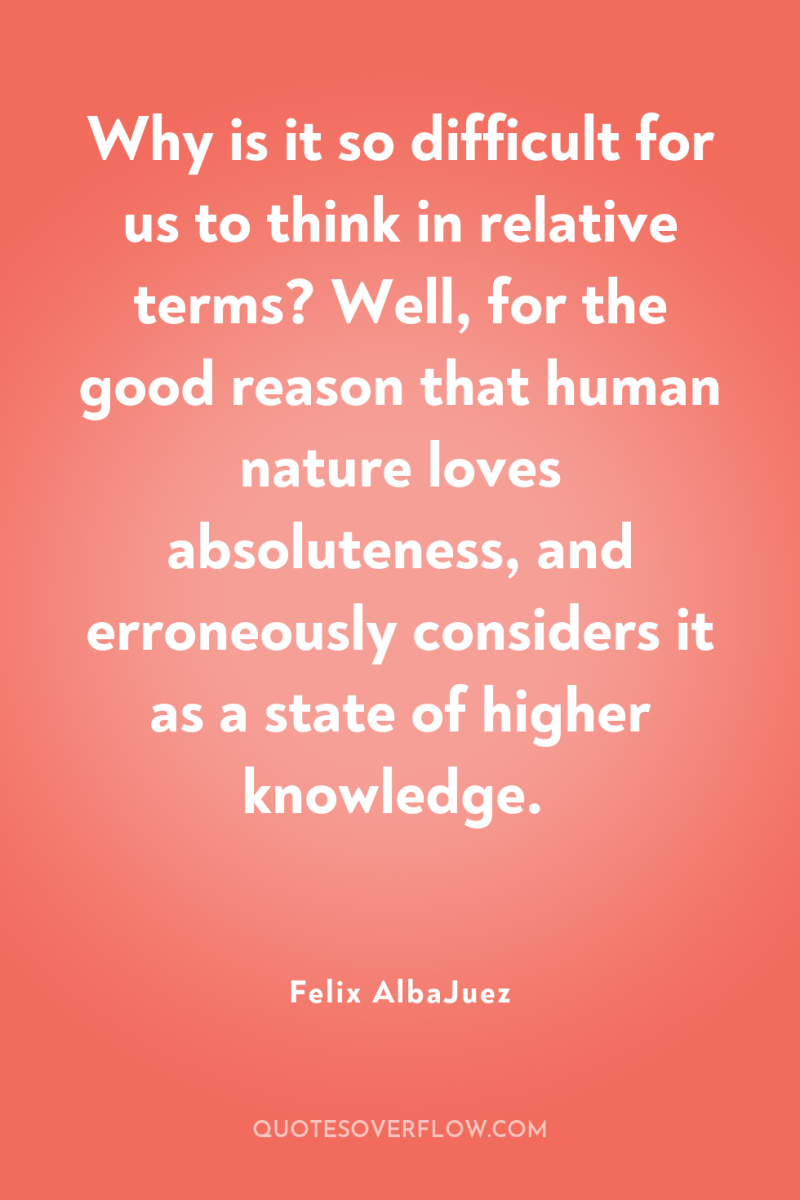
5
Why is it so difficult for us to think in relative terms? Well, for the good reason that human nature loves absoluteness, and erroneously considers it as a state of higher knowledge.Felix AlbaJuez
6
The best ship, the best culture, the best knowledge, is the one which allows us to go farther, explore more territories or oceans of reality, and have the least damaging leaks possible.Jesus Zamora Bonilla
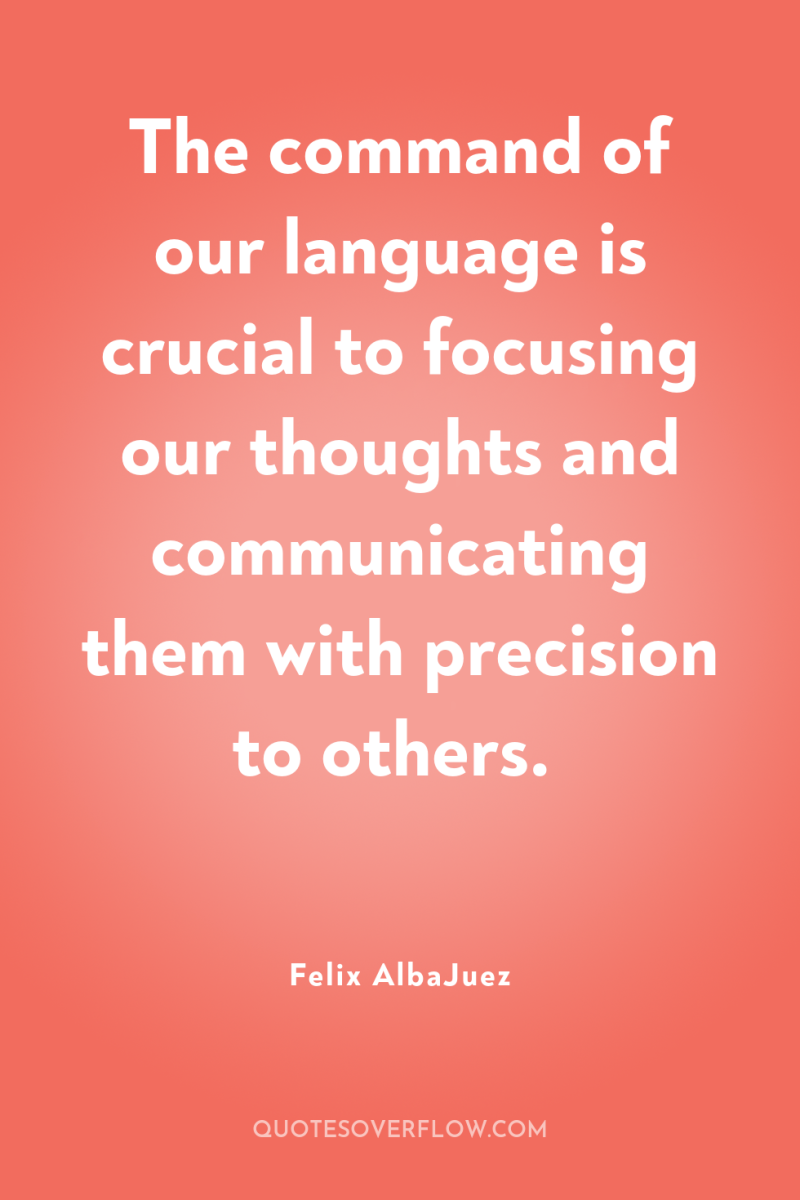
7
The command of our language is crucial to focusing our thoughts and communicating them with precision to others.Felix AlbaJuez
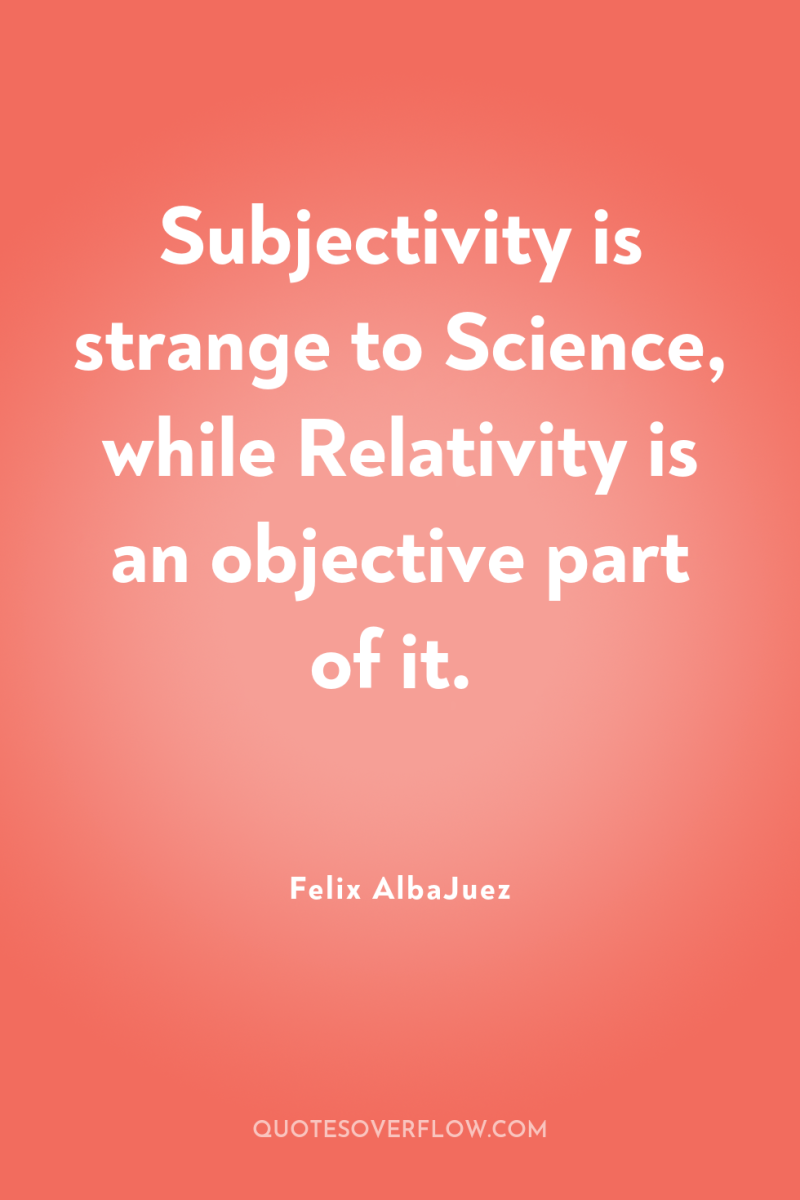
8
Subjectivity is strange to Science, while Relativity is an objective part of it.Felix AlbaJuez
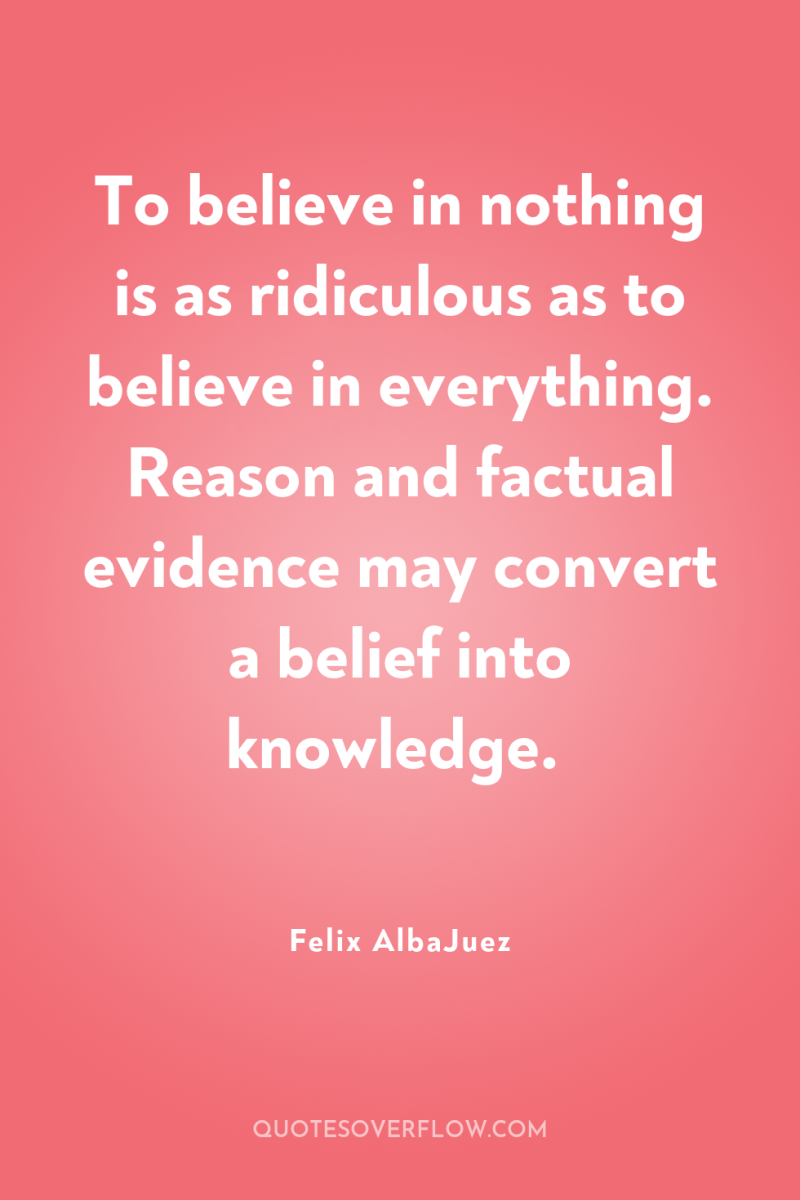
9
To believe in nothing is as ridiculous as to believe in everything. Reason and factual evidence may convert a belief into knowledge.Felix AlbaJuez
10
Comprehending and knowing better and deeper are the best guarantees we can have to attain ideas and criteria of our own; i.e. to stop depending on what other people say. In summary, to be freer to choose our own path in life.Unknown
11
Truth is not as pompous and romantic as myth ... but it has the immeasurable value of being the Truth.Felix AlbaJuez
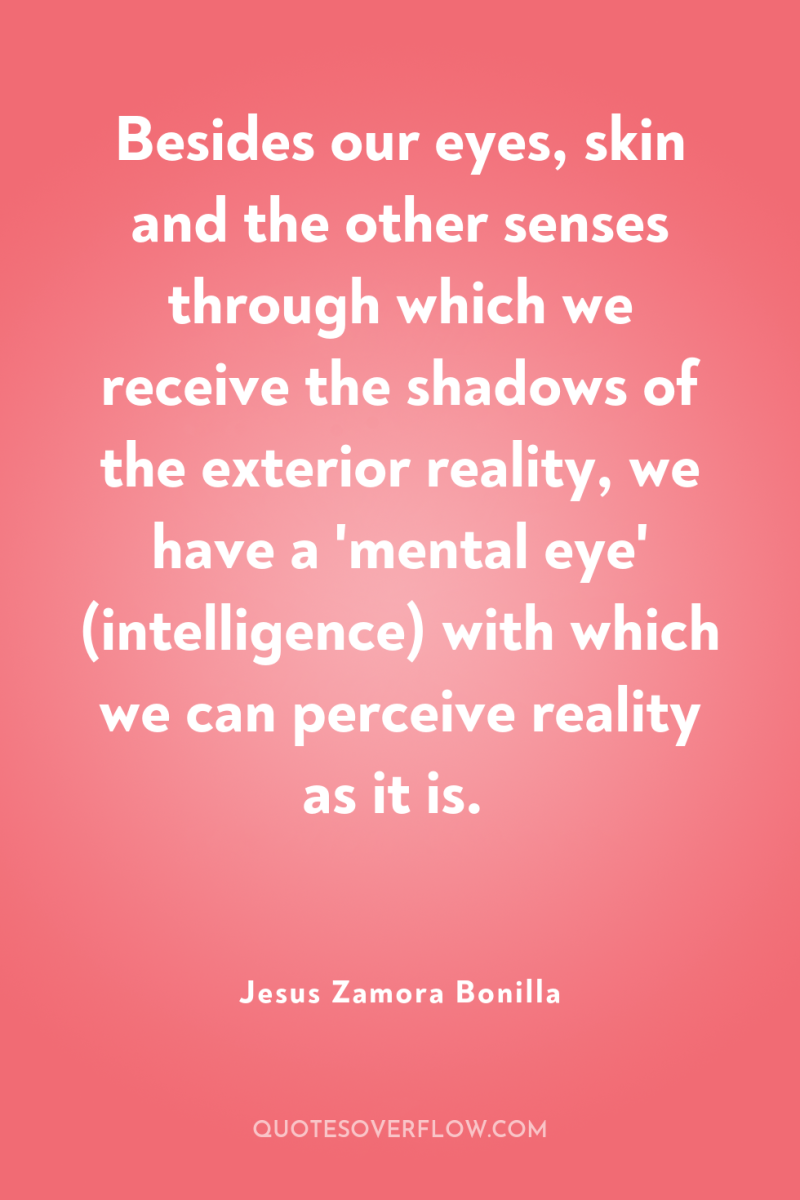
12
Besides our eyes, skin and the other senses through which we receive the shadows of the exterior reality, we have a 'mental eye' (intelligence) with which we can perceive reality as it is.Jesus Zamora Bonilla
13
After some cogitation, it is difficult not to agree with Herman Bondi (1919 - 2005), who in his book 'Relativity and Common Sense' says:... The surprising thing, surely, is that molecules in a gas behave so much as billiard balls, not that electrons behave so little like billiard balls.Felix AlbaJuez
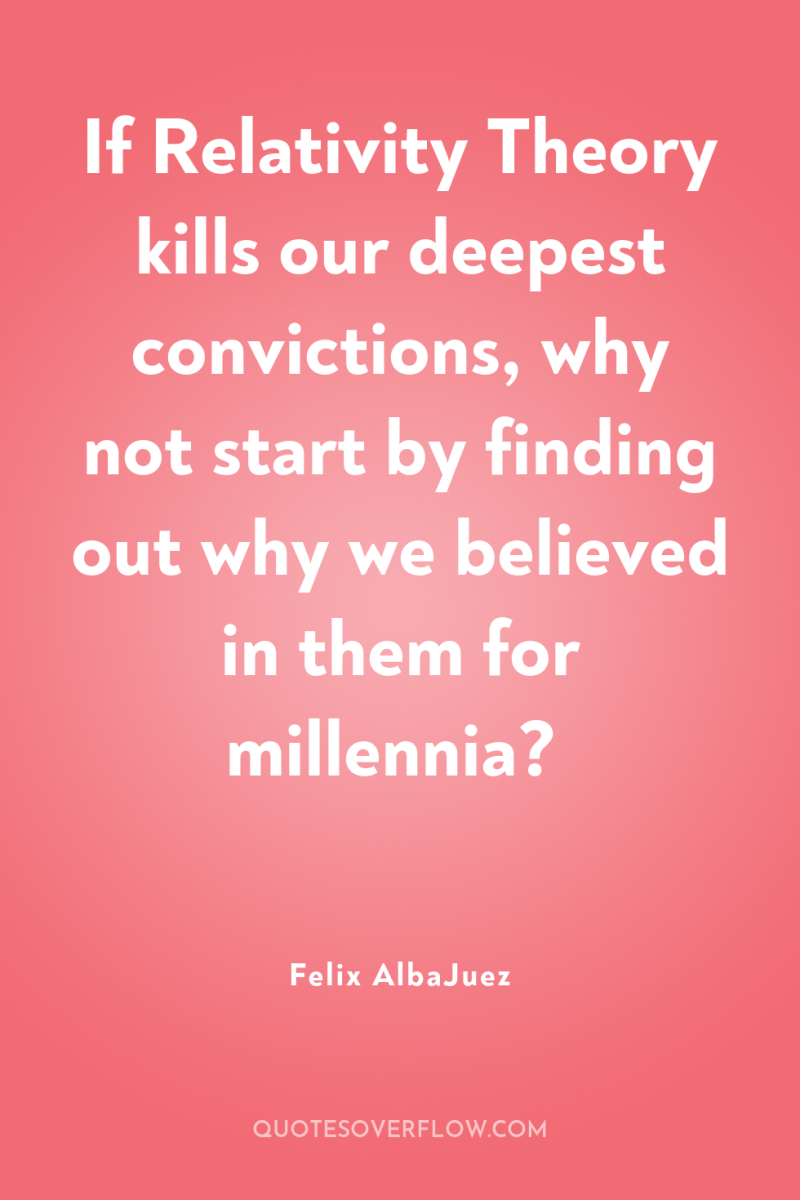
14
If Relativity Theory kills our deepest convictions, why not start by finding out why we believed in them for millennia?Felix AlbaJuez
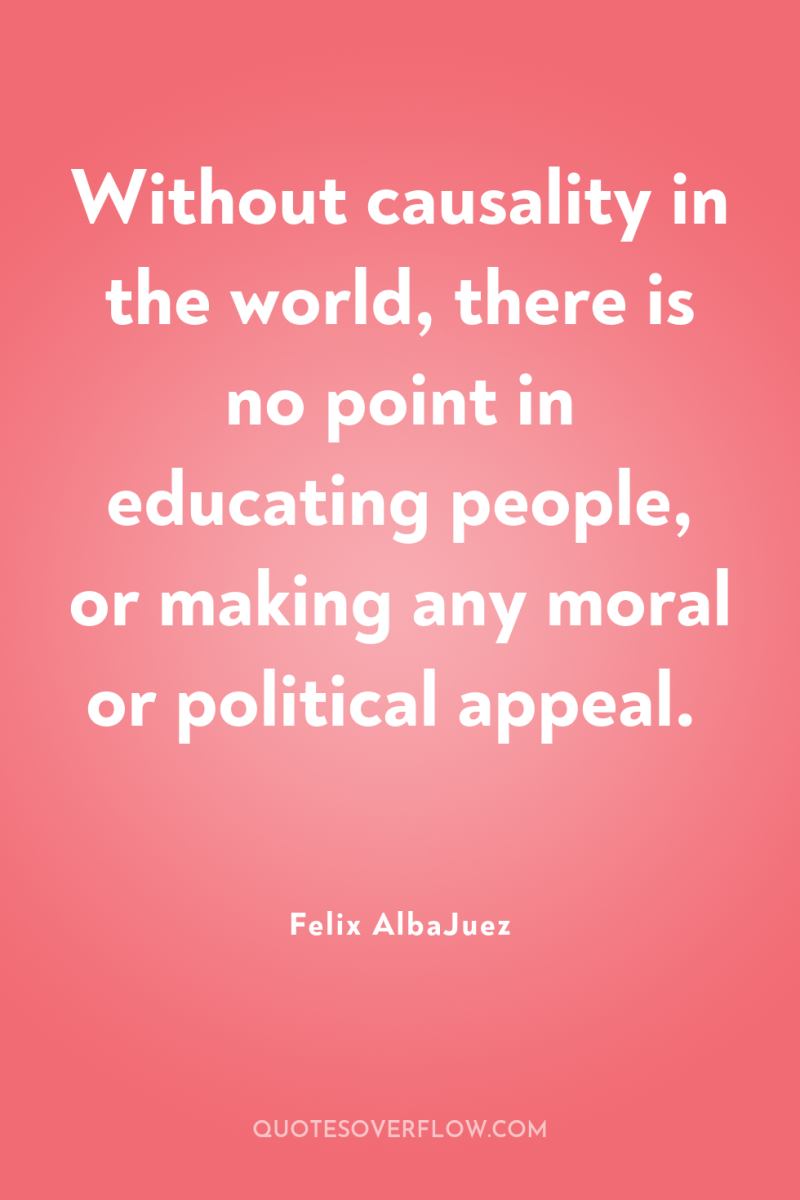
15
Without causality in the world, there is no point in educating people, or making any moral or political appeal.Felix AlbaJuez
16
The fundament upon which all our knowledge and learning rests is the inexplicable.Arthur Schopenhauer
17
The most perfect and satisfactory knowledge is that of perception but this is limited to the absolutely particular, to the individual. The comprehension of the many and the various into *one* representation is possible only through the *concept*, in other words, by omitting the differences; consequently, the concept is a very imperfect way of representing things. The particular, of course, can also be apprehended immediately as a universal, namely when it is raised to the (Platonic) *Idea*; but in this process, which I have analysed in the third book, the intellect passes beyond the limits of individuality and therefore of time; moreover, this is only an exception. These inner and essential imperfections of the intellect are further increased by a disturbance to some extent external to it but yet inevitable, namely, the influence that the *will* exerts on all its operations, as soon as that will is in any way concerned in their result. Every passion, in fact every inclination or disinclination, tinges the objects of knowledge with its colour. Most common of occurrence is the falsification of knowledge brought about by desire and hope, since they show us the scarcely possible in dazzling colours as probable and well-nigh certain, and render us almost incapable of comprehending what is opposed to it. Fear acts in a similar way; every preconceived opinion, every partiality, and, as I have said, every interest, every emotion, and every predilection of the will act in an analogous manner. Finally, to all these imperfections of the intellect we must also add the fact that it grows old with the brain; in other words, like all physiological functions, it loses its energy in later years; in this way all its imperfections are then greatly increased.”–from_ The World as Will and Representation_. Translated from the German by E. F. J. Payne in two volumes: volume II, pp. 139-141.Arthur Schopenhauer
18
Our critique is not opposed to the *dogmatic procedure* of reason in its pure knowledge as science (for science must always be dogmatic, that is, derive its proof from secure *a priori* principles), but only to *dogmatism*, that is, to the presumption that it is possible to make any progress with pure (philosophical) knowledge from concepts according to principles, such as reason has long been in the habit of using, without first inquiring in what way, and by what right, it has come to posses them. Dogmatism is therefore the dogmatic procedure of pure reason, *without a preceding critique of its own powers*; and our opposition to this is not intended to defend that loquacious shallowness which arrogates to itself the name of popularity, much less that skepticism which makes short work of the whole of metaphysics. On the contrary, our critique is meant to form a necessary preparation in support of metaphysics as a thorough science, which must necessarily be carried out dogmatically and strictly systematically, so as to satisfy all the demands, no so much of the public at large, as of the Schools. This is an indispensable demand for it has undertaken to carry out its work entirely *a priori*, and thus to carry it out to the complete satisfaction of speculative reason. In the execution of this plan, as traced out by the critique, that is, in a future system of metaphysics, we shall have to follow the strict method of the celebrated Wolff, the greatest of all dogmatic philosophers. He was the first to give an example (and by his example initiated, in Germany, that spirit of thoroughness which is not yet extinct) of how the secure course of a science could be attained only through the lawful establishment of principles, the clear determination of concepts, the attempt at strictness of proof and avoidance of taking bold leaps in our inferences. He was therefore most eminently qualified to give metaphysics the dignity of a science, if it had only occurred to him to prepare his field in advance by criticism of the organ, that is, of pure reason itself―an omission due not so much to himself as to the dogmatic mentality of his age, about which the philosophers of his own, as well as of all previous times, have no right to reproach one another. Those who reject both the method of Wolff and the procedure of the critique of pure reason can have no other aim but to shake off the fetters of *science* altogether, and thus to change work into play, certainty into opinion and philosophy into philodoxy." ―from_Critique of Pure Reason_. Preface to the Second Edition. Translated, edited, and with an Introduction by Marcus Weigelt, based on the translation by Max Müller, pp. 28-29 .Immanuel Kant
19
Metaphysics, a completely isolated and speculative branch of rational knowledge which is raised above all teachings of experience and rests on concepts only (not, like mathematics, on their application to intuition), in which reason therefore is meant to be its own pupil, has hitherto not had the good fortune to enter upon the secure path of a science, although it is older than all other sciences, and would survive even if all the rest were swallowed up in the abyss of an all-destroying barbarism. Reason in metaphysics, even if it tries, as it professes, only to gain *a priori* insight into those laws which are confirmed by our most common experience, is constantly being brought to a standstill, and we are obliged again and again to retrace our steps, as they do not lead us where we want to go. As to unanimity among its participants, there is so little of it in metaphysics that it has rather become an arena that would seem especially suited for those who wish to exercise themselves in mock fights, where no combatant has as yet succeeded in gaining even an inch of ground that he could call his permanent possession. There cannot be any doubt, therefore, that the method of metaphysics has hitherto consisted in a mere random groping, and, what is worst of all, in groping among mere concepts. What, then, is the reason that this secure scientific course has not yet been found? Is this, perhaps, impossible? Why, in that case, should nature have afflicted our reason with the restless aspiration to look for it, and have made it one of its most important concerns? What is more, how little should we be justified in trusting our reason, with regard to one of the most important objects of which we desire knowledge, it not only abandons us, but lures us on by delusions, and in the end betrays us! Or, if hitherto we have only failed to meet with the right path, what indications are there to make us hope that, should we renew our search, we shall be more successful than others before us?"―from_ Critique of Pure Reason_. Preface to the Second Edition. Translated, edited, and with an Introduction by Marcus Weigelt, based on the translation by Max Müller, p. 17 .Immanuel Kant
20
A similar experiment may be tried in metaphysics as regards the *intuition* of objects. If the intuition had to conform to the constitution of objects, I would not understand how we could know anything of them *a priori*; but if the object (as object of the senses) conformed to the constitution of our faculty of intuition, I could very well conceive such a possibility. As, however, I cannot rest in these intuitions if they are to become knowledge, but have to refer them as representations, to something as their object, and must determine this object through them, I can assume either that the *concepts* through which I arrive at this determination also conform to the object, and I would again be as perplexed about how I can know anything about it *a priori*; or else that the objects, or what is the same thing, the *experience* in which alone they are known (as objects that are given to us), conform to those concepts. In the latter case, I recognize an easier solution because experience itself is a kind of knowledge that requires understanding; and this understanding has its rules which I must presuppose as existing within me even before objects are given to me, and hence *a priori*. These rules are expressed in *a priori* concepts to which all objects of experience must necessarily conform, and with which they must agree. With regard to objects, insofar as they are thought merely through reason and thought indeed as necessary, and which can never, at least not in the way in which reason thinks them, be given in experience, the attempts at thinking them (for they must admit of being thought) will subsequently furnish an excellent touchstone of what we are adopting as our new method of thought, namely, that we know of things *a priori* only that which we ourselves put into them."―from_ Critique of Pure Reason_. Preface to the Second Edition. Translated, edited, and with an Introduction by Marcus Weigelt, based on the translation by Max Müller, pp. 18-19 .Immanuel Kant
21
The purpose of this critique of pure speculative reason consists in the attempt to change the old procedure of metaphysics, and to bring about a complete revolution after the example set by geometers and investigators of nature. This critique is a treatise on the method, not a system of the science itself; but nevertheless it marks out the whole plan of this science, both with regard to its limits and with regard to its inner organization. For it is peculiar to pure speculative reason that it is able, indeed bound, to measure its own powers according to the different ways in which it chooses its objects for thought, and to enumerate exhaustively the different ways of choosing its problems, thus tracing a complete outline of a system of metaphysics. This is due to the fact that, with regard to the first point, nothing can be attributed to objects in *a priori* knowledge, except what the thinking subject takes from within itself; while, with regard to the second point, pure reason, as far as its principles of knowledge are concerned, forms a separate and independent unity, in which, as in an organized body, every member exists for the sake of all the others, and all the others exist for the sake of the one, so that no principle can be safely applied in *one* relation unless it has been carefully examined in *all* its relations to the whole use of pure reason. Hence, too, metaphysics has this singular advantage, an advantage which cannot be shared by any other rational science which has to deal with objects (for *logic* deals only with the form of thought in general), that if by means of this critique it has been set upon the secure course of a science, it can exhaustively grasp the entire field of knowledge pertaining to it, and can thus finish its work and leave it to posterity as a capital that can never be added to, because it has to deal only with principles and with the limitations of their use, as determined by these principles themselves. And this completeness becomes indeed an obligation if metaphysics is to be a fundamental science, of which we must be able to say, *nil actum reputants, si quid superesset agendum* [to think that nothing was done for as long as something remained to be done]." ―from_Critique of Pure Reason_. Preface to the Second Edition. Translated, edited, and with an Introduction by Marcus Weigelt, based on the translation by Max Müller, pp. 21-22 .Immanuel Kant
22
We have seen, therefore, that I am not allowed even to *assume*, for the sake of the necessary practical use of my reason *God, freedom, immortality*, unless at the same time *I deprive* speculative reason of its pretensions to transcendent insights. Reason, namely, in order to arrive at these, must employ principles which extend only to objects of possible experience, and which, if in spite of this they are applied also to what cannot be an object of experience, actually always change this into an appearance, thus rendering all practical *expansion* of pure reason impossible. Hence I had to suspend *knowledge* in order to make room for *belief*. For the dogmatism of metaphysics without a preceding critique of pure reason, is the source of all that disbelief which opposes morality and which is always very dogmatic." ―from_Critique of Pure Reason_. Preface to the Second Edition. Translated, edited, and with an Introduction by Marcus Weigelt, based on the translation by Max Müller, pp. 25-26.Immanuel Kant
23
What is gained by the transcendence of the object is the identifiability of the object in a plurality of acts and the identifiability of what is thought by several individuals. This identifiability is not restricted to ideal objects, which are generated according to a definite operational law and are therefore producible by everyone out of the same material of intuition which is given prior to any particular sense-experience. The identifiability obtains in precisely the same way for objects of myth and folklore, of belief and artistic fantasy. Goethe’s Faust, Apollo, and Little Red Riding Hood can be identified by several individuals and are the objects of common, universally valid statements. Indeed, exact identity of the nature of the object in question and evidential knowledge of this identity can occur *only* in the case of ideal objects. Our certainty that we all think the same number 3 in the strictest identity of its nature is much more evident than that we all think the same real object, a tree, for instance. In the case of real objects we can actually prove that it is impossible for the momentary content in which the object is represented and thought to be exactly the same in a plurality of acts and for many individuals. The only other contribution made by the fact of the consciousness of transcendence, so long overlooked in recent philosophy, to the problem of reality is this: the acts in which this consciousness is present can bring the givenness of reality, of which we shall speak later, into “objective” form, and can therefore elevate that which is given in this way as real to the status of a real “object.” But with this, the contribution of the consciousness of transcendence to the problem of reality is at an end. Although N. Hartmann made the same point with respect to Paul Linke’s otherwise shrewd and pertinent comments on his doctrine of reality, still we should emphasize that the transcendence of the object does not *exclude* the reality of the object, not even of the *same* object in the strict sense of “same.” ―from_Idealism and Realism_.Max Scheler
24
It will be seen how there can be the idea of a special science, the *critique of pure reason* as it may be called. For reason is the faculty which supplies the *principles* of *a priori* knowledge. Pure reason therefore is that which contains the principles of knowing something entirely *a priori*. An *organon* of pure reason would be the sum total of the principles by which all pure *a priori* knowledge can be acquired and actually established. Exhaustive application of such an organon would give us a system of pure reason. But as this would be a difficult task, and as at present it is still doubtful whether indeed an expansion of our knowledge is possible here at all, we may regard a science that merely judges pure reason, its sources and limits, as the *propaedeutic* to the system of pure reason. In general, it would have to be called only a *critique*, not a *doctrine* of pure reason. Its utility, in regard to speculation, would only be negative, for it would serve only to purge rather than to expand our reason, and, which after all is a considerable gain, would guard reason against errors. I call all knowledge *transcendental* which deals not so much with objects as with our manner of knowing objects insofar as this manner is to be possible *a priori*. A system of such concepts would be called *transcendental philosophy*. But this is still, as a beginning, too great an undertaking. For since such a science must contain completely both analytic and synthetic *a priori* knowledge, it is, as far as our present purpose is concerned, much too comprehensive. We will be satisfied to carry the analysis only so far as is indispensably necessary in order to understand in their whole range the principles of *a priori* synthesis, with which alone we are concerned. This investigation, which properly speaking should be called only a transcendental critique but not a doctrine, is all we are dealing with at present. It is not meant to expand our knowledge but only to correct it, and to become the touchstone of the value, or lack of value, of all *a priori* knowledge. Such a critique is therefore the preparation, as far as possible, for a new organon, or, if this should turn out not to be possible, for a canon at least, according to which, thereafter, the complete system of a philosophy of pure reason, whether it serve as an expansion or merely as a limitation of its knowledge, may be carried out both analytically and synthetically. That such a system is possible, indeed that it need not be so comprehensive as to cut us off from the hope of completing it, may already be gathered from the fact that it would have to deal not with the nature of things, which is inexhaustible, but with the understanding which makes judgments about the nature of things, and with this understanding again only as far as its *a priori* knowledge is concerned. The supply of this *a priori* knowledge cannot be hidden from us, as we need not look for it outside the understanding, and we may suppose this supply to prove sufficiently small for us to record completely, judge as to its value or lack of value and appraise correctly. Still less ought we to expect here a critique of books and systems of pure reason, but only the critique of the faculty of pure reason itself. Only once we are in possession of this critique do we have a reliable touchstone for estimating the philosophical value of old and new works on this subject. Otherwise, an unqualified historian and judge does nothing but pass judgments upon the groundless assertions of others by means of his own, which are equally groundless.Immanuel Kant
25
It is very important to note that the transcendence of the object is by no means a primitive component necessarily ingredient in all knowledge. It is missing in all ecstatic knowledge. In ecstatic knowledge the known world is still not objectively given. Only when the (logically and genetically simultaneous) act furnishing ecstatic knowledge and the subject which performs this act become themselves the content of knowledge in the act of reflection does the character originally given in ecstatic knowledge become a mere reference pointing to the “object.” It is only here that the object or that which turns into an object remains from now on “transcendent” to consciousness. Therefore, whenever there is consciousness, objects transcendent to consciousness must also be given to consciousness. Their structural relationship is indissoluble. Whenever self-consciousness and consciousness of an object arise, they do so simultaneously and through the same process. The categorical form of an object is not first impressed in a judgment upon a nonobjective given, not even in a one-term, simple judgment, as some people have thought (e.g., Heinrich Maier in his book *Wahrheit und Wirklichkeit*). This is a pure construction. Consciousness of an object precedes all judgment and is not originally constituted by judgment. The same holds true of consciousness of states of affairs. The consciousness of an object and the intentional object are not the result of an active [tätige] “forming” or “imprinting” which we perform on the given through judgments or any other operations of thought. On the contrary, they are the result of a pulling back, the result, that is, of the re-flexive act, in which an originally ecstatic [*ekstatisch gebender*] act turns back knowingly onto itself and comes upon a central self as its starting point. This central self can be given at every level and degree of “concentration” and “collectedness” in “self-consciousness.” What we had hold of [*das Gehabte*] remains “as” object, while the act of reflection turns the knowing back into the knower, as the result of a turning away [*Abwendung*] and a pulling back, and not of an active turning to [*Zuwendung*].From what has been said, one may very well imagine that the real world could be abolished without consciousness and the self being altered or abolished thereby. But this could in no way be the case with the world of objects that transcend consciousness. Descartes as well as Lotze misunderstood this. Where a *cogito* exists, there must also be a *cogitatur* in which a transcendent object is thought. Only a being capable of reflection (*reflexio*) and self-consciousness *can* have objects. Charlotte Bühler has recently made it seem probable that the infant does not yet possess objective consciousness. In waking from the effects of a drug we can follow the process by which the givenness of the surrounding world becomes objective again. There is one last point of contact between the problem of reality and the consciousness of transcendence. The consciousness of transcendence, as already indicated, shows how the mere ecstatic possession of reality on the level of the immediately experienced resistance of an X to the central drives of life passes over into a reflexive and thus objective possession of reality. And we find similar transitions between ecstatic remembering which is merged in the being of what is past and reflexive remembering, between ecstatic drive activities and recurrent deliberation [*Besinnung*], between ecstatic surrender to a value and objectification of a value, between identifying with an alter ego and “understanding” [*Verstehen*] another, however slightly.” ―from_Idealism and Realism_ .Max Scheler
26
The third preliminary problem for every theory of reality is that of the experience of transcendence. We saw in the case of Berkeley that his erroneous principle *percipi est esse*, and his assertion that any being which we think, just for the reason that it is thought, cannot at the same time be regarded as subsisting independently of thinking, incorporate a failure to recognize the consciousness of transcendence peculiar to all intentional acts. This is an instance of the failure to recognize that not only all thinking in the narrower sense, in the sense of grasping an object on the basis of “meanings” and grasping a state of affairs through judgments, but *every* intention in general, whether perception, representation, remembering, the feeling of value, or the posing of ends and goals, points beyond the act and the contents of the act and intends something other than the act [*ein Aktfremdes*], even when what is thought is in turn itself a thought. Indeed, *intentio* signifies a goal-directed movement toward something which one does not have oneself or has only partially and incompletely. Berkeley (following Locke, who was the first to make the basic philosophical error which introduced “psychologism” into epistemology) arrived at the principle *esse est percipi* by making the idea [*Vorstellung*] (and even the sensation) into a thing, an immaterial substance, and by failing to distinguish between the act, the content of an act, and the object. Furthermore, Berkeley confused the being of objects with the fact of being-an-object, even though the latter has only a loose and variable connection with the former. On the other hand, the transcendence of the intentional object with respect to both the *intentio* and its present content is common to every instance of being-an-object. It is, for instance, proper to objects of pure mathematics which are certainly not real but ideal (for example, the number 3). These are produced from the *a priori* material of intuition in accordance with an operational law governing the steps of our thought or intuition. Transcendence is further proper to all fictitious objects and even to contradictory objects, for instance, a square circle. All these sorts of objects, e.g., the golden mountain or Little Red Riding Hood, satisfy the basic principle of the transcendence of objects over and above that aspect of them which is, at any moment, given in consciousness, just as much as do real objects existing independently of all consciousness and knowledge."―from_ Idealism and Realism_ .Max Scheler
27
It is precisely because the principle of the transcendence of the object is completely independent of the existential status of the objects themselves and, thus, independent of the question whether they are produced by us or subsist on their own―whether they are fictions or real beings―that the fact of the consciousness of transcendence is not even remotely qualified to solve the problem of reality. This has been misunderstood equally by W. Freytag, Edith Landmann, P. Linke, and even by Husserl himself. Indeed, people have wanted to speak of an intentional realism (E. Landmann) in contrast to Critical Realism and to all other forms of realism. N. Hartmann was quite correct in emphasizing, in opposition to this, that the projection [*Hinausragen*] of the intentional object beyond the content of consciousness and its act cannot make the least contribution to solving the problem of realism. If something is an intentional object, we cannot recognize from this fact alone, whether it is real or not. If the perceived cherry, the conceived triangle, a friend’s visit anticipated in a dream, Little Red Riding Hood, a freely planned project, or a felt value, have entirely different characteristics and predicates than do the mental processes and the actual contents in which these objects appear, then the distinction between intentional and mental holds equally of both the real and the irreal. *Thus, the problem of what is real is not touched by the fact of the transcendence of the object*, and *percipi est esse*, in Berkeley’s psychologistic sense, is laid to rest. This also frustrates attempts, such as Hume’s in his *Treatise*, to derive being-an-object in general―an object as distinguished from an idea―from a psychogenetic process in which the very ideas through which this psychogenetic process is supposed to be accomplished are themselves reified [*verdinglicht*]."―from_Idealism and Realism_ .Max Scheler
28
Only after the concept of knowledge has been based on an ontological relation [*Seinsverhältnis*] can we work out the particular kind of being from which the principle of immanence-to-consciousness (the starting point of Idealism and Critical Realism) mistakenly proceeds as though from a primary insight. This is the being of "being-conscious" [*Bewusst-Seins*]. All being-conscious must first of all be brought under the higher concept of ideal being, or, at all events, that of irreal being. The mental item which presents itself in the experiences of consciousness may be real; being-conscious itself never is. However, the concept of consciousness is derivative in not only this sense. Consciousness also presupposes the concept of knowledge. Nothing is more misleading than to proceed in the opposite direction and define knowledge itself as simply a particular "content of consciousness, " as we see if we oppose, to the particular kind of knowing and having-known which we call consciousness, another kind of knowledge which precedes it and includes no form of being-conscious. We will call this knowledge *ecstatic* [*ekstatische*] knowledge. It is found quite clearly in animals, primitive people, children, and, further, in certain pathological and other abnormal and supra-normal states (e.g., in recovering from the effects of a drug). I have said elsewhere that the animal never relates to its environment as to an object but only *lives in it* [*es lebe nur "in sie hinein*"]. Its conduct with respect to the external world depends upon whether the latter satisfies its instinctive drives or denies them satisfaction. The animal experiences the surrounding world as resistances of various types. Hence, it is absolutely necessary to contest the principle (in Descartes, Franz Brentano, *et al*.) that every mental function and act is accompanied by an immediate knowledge of it. An even more highly contestable principle is that a relation to the self is an essential condition of all processes of knowledge. It is difficult to reproduce purely ecstatic knowledge in mature, civilized men, whether in memory, reverie, perception, thought, or empathetic identification with things, animals, or men; nonetheless, there is no doubt that in every perception and presentation of things and events we think that we grasp *the things-themselves*, not mere "images" of them or representatives of some sort. Knowledge first becomes conscious knowledge [*Bewusst-sein*], that is, comes out of its original ecstatic form of simply "having" things, in which there is no knowledge of the having or of that through which and in which it is had, when the act of being thrown back on the self (probably only possible for men) comes into play. This act grows out of conspicuous resistances, clashes, and oppositions―in sum, out of pronounced suffering. It is the *actus re-flexivus* in which knowledge of the knowledge of things is added to the knowledge of things. Furthermore, in this act we come to know the kind of knowledge we have, for example, memory, ideation, and perception, and finally, beyond even these, we come to have a knowledge of the relation of the act performed to the self, to the knower. With respect to any specific relation to the self, this last knowledge, so-called conscious self-knowledge, comes only after knowledge about the act. Kant's principle that an "I think" must be *able* to accompany all a man's thoughts may be correct. That it in fact always accompanies them is nevertheless undoubtedly false. However, the kind of being (indeed, of ideal being) which contents possess when they are reflexively *had* in their givenness in conscious acts―when, therefore, they become reflexive―is the being of being-consciously-known."from_ Idealism and Realism_ .Max Scheler
29
We must reject entirely the frequently encountered assertion that consciousness is a "primal fact, " that one ought not speak of an "origin" of consciousness. The very same laws and motives in accordance with which we think of consciousness' raising itself from one level of reflection to the next will apply when we think of consciousness itself originating out of a preconscious, partly subconscious, partly supraconscious condition of the being of the contents of knowledge. (And the motive is always suffering of some sort, suffering, as we shall see, at the hands of the real being [*Realsein*] which is ecstatically given prior to all consciousness.) Only a very definite historical stage of overreflective bourgeois civilization could make the fact of consciousness the starting point of all theoretical philosophy, without characterizing more exactly the mode of being of this consciousness."―from_ Idealism and Realism_ .Max Scheler
30
Our knowledge springs from two fundamental sources of our mind; the first is to receive representations (receptivity of impressions), the second is the faculty of knowing an object through these representations (spontaneity of concepts). Through the first an object is *given* to us, through the second the object is *thought* in relation to that representation (which is a mere determination of the mind). Intuition and concepts constitute, therefore, the elements of all our knowledge, so that neither concepts without an intuition in some way corresponding to them, nor intuition without concepts can yield knowledge. Both are either pure or empirical. They are empirical when they contain sensation (sensation presupposes the actual presence of the object). They are *pure* when no sensation is mixed in with the representation. Sensation may be called the matter of sensible knowledge. Pure intuition, therefore, contains only the form under which something is intuited, and the pure concepts contains only the form of thinking an object in general. Pure intuitions and pure concepts alone are possible *a priori*, empirical intuitions and empirical concepts only *a posteriori*. We call *sensibility* the *receptivity* of our mind to receive representations insofar as it is in some wise affected, while the *understanding*, on the other hand, is our faculty of producing representations by ourselves, or the *spontaneity* of knowledge. We are so constituted that our intuition can never be other than *sensible*; that is, it contains only the mode in which we are affected by objects. The faculty, on the contrary, which enables us to *think* the object of sensible intuition is the *understanding*. Neither of these properties is to be preferred to the other. Without sensibility no object would be given to us, without understanding no object would be thought. Thoughts without content are empty, intuitions without concepts are blind. It is, therefore, just as necessary to make our concepts sensible (i.e., to add the object to them in intuition) as to make our intuitions understandable (i.e., to bring them under concepts). These two faculties or capacities cannot exchange their functions. The understanding cannot intuit anything, the senses cannot think anything. Only from their union can knowledge arise. But this is no reason for confounding their respective contributions; rather, it gives us a strong reason for carefully separating and distinguishing the one from the other. We therefore distinguish the science of the rules of sensibility in general, i.e., aesthetic, from the science of the rules of the understanding in general, i.e., logic."― Transcendental Doctrine of Elements. Transcendental Logic: The Idea of a Transcendental Logic.Immanuel Kant
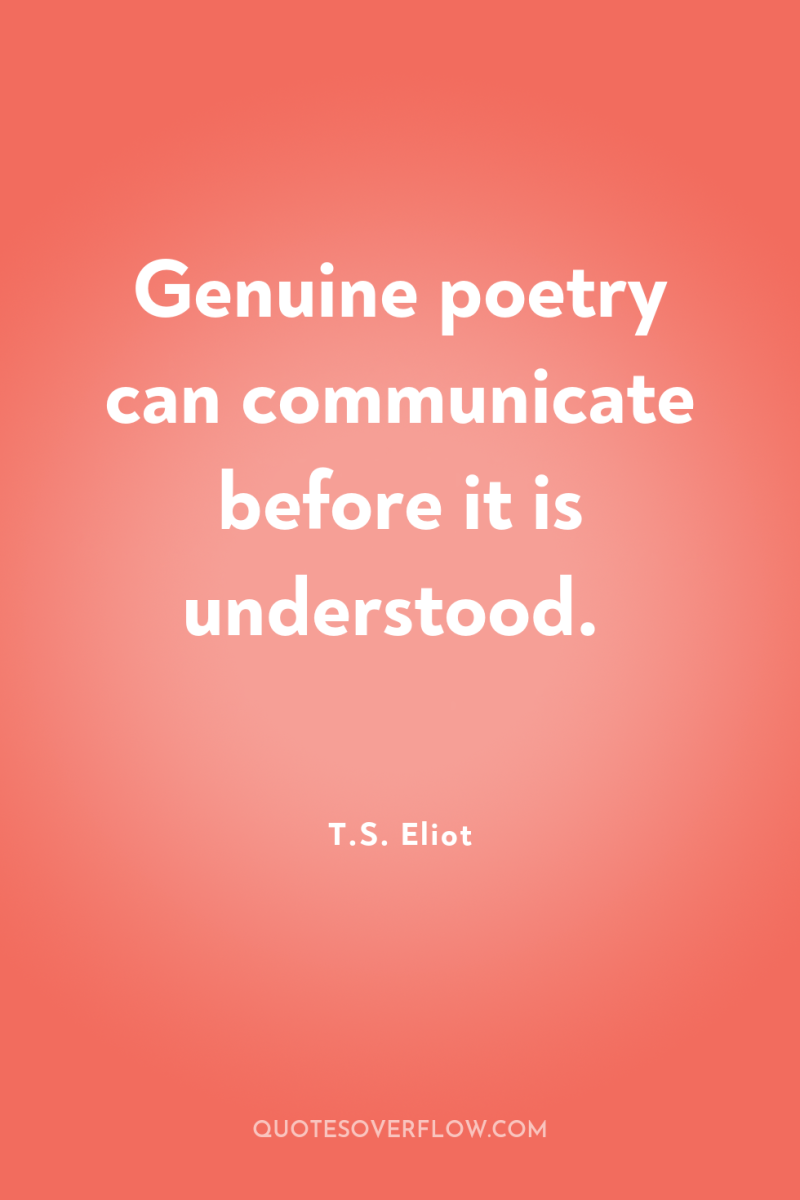
31
Genuine poetry can communicate before it is understood.T.S. Eliot
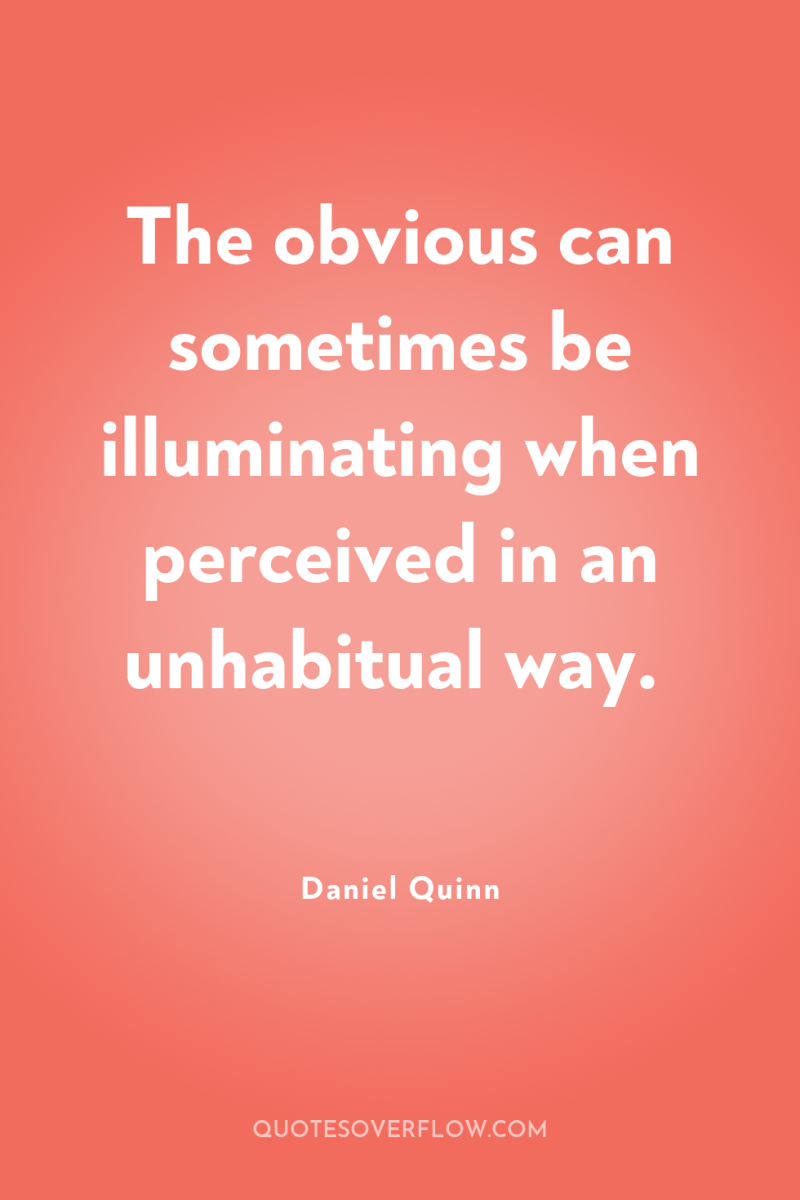
32
The obvious can sometimes be illuminating when perceived in an unhabitual way.Daniel Quinn
33
Science is often misrepresented as ‘the body of knowledge acquired by performing replicated controlled experiments in the laboratory.’ Actually, science is something broader: the acquisition of reliable knowledge about the world.Jared Diamond
34
In mysticism, knowledge cannot be separated from a certain way of life which becomes its living manifestation. To acquire mystical knowledge means to undergo a transformation; one could even say that the knowledge is the transformation. Scientific knowledge, on the other hand, can often stay abstract and theoretical. Thus most of today’s physicists do not seem to realize the philosophical, cultural and spiritual implications of their theories. .Lois McMaster Bujold

35
Knowledge is a social construct, a consensus among the members of a community of knowledgeable peers.Kenneth A. Bruffee

36
He who would know the world must first manufacture it.Immanuel Kant
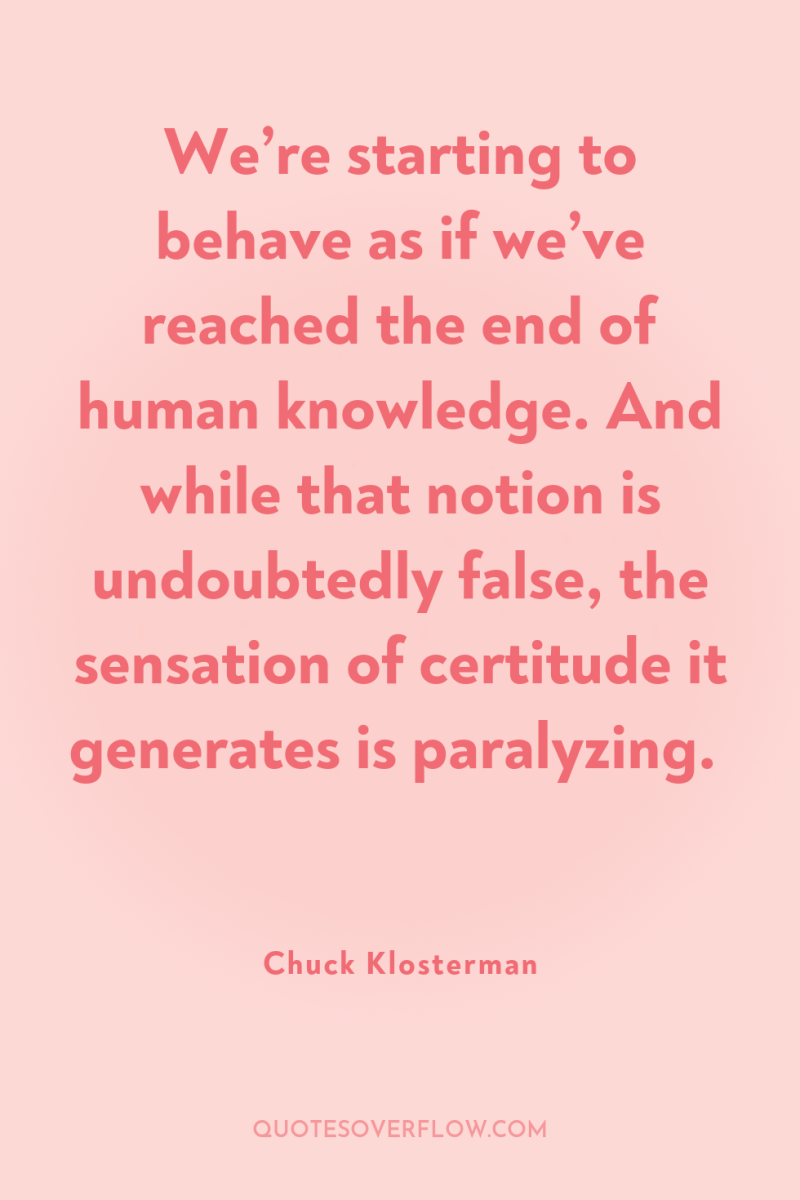
37
We’re starting to behave as if we’ve reached the end of human knowledge. And while that notion is undoubtedly false, the sensation of certitude it generates is paralyzing.Chuck Klosterman
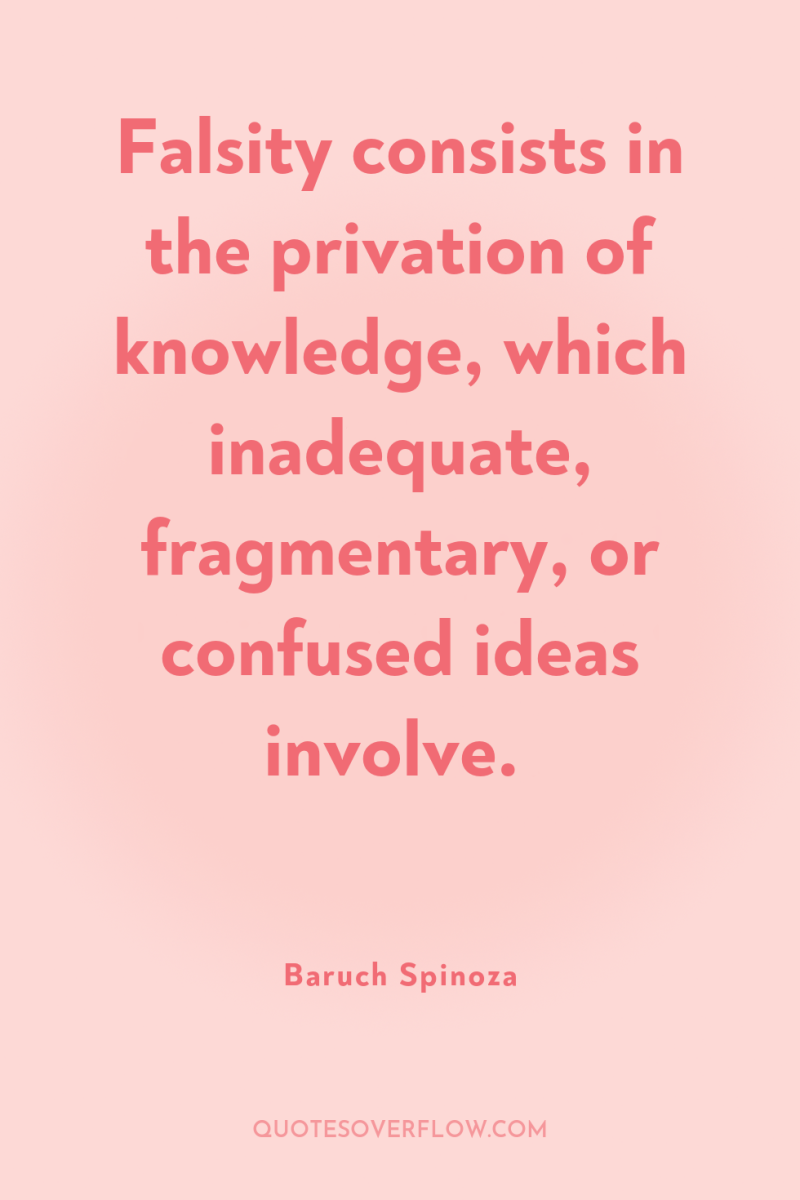
38
Falsity consists in the privation of knowledge, which inadequate, fragmentary, or confused ideas involve.Baruch Spinoza
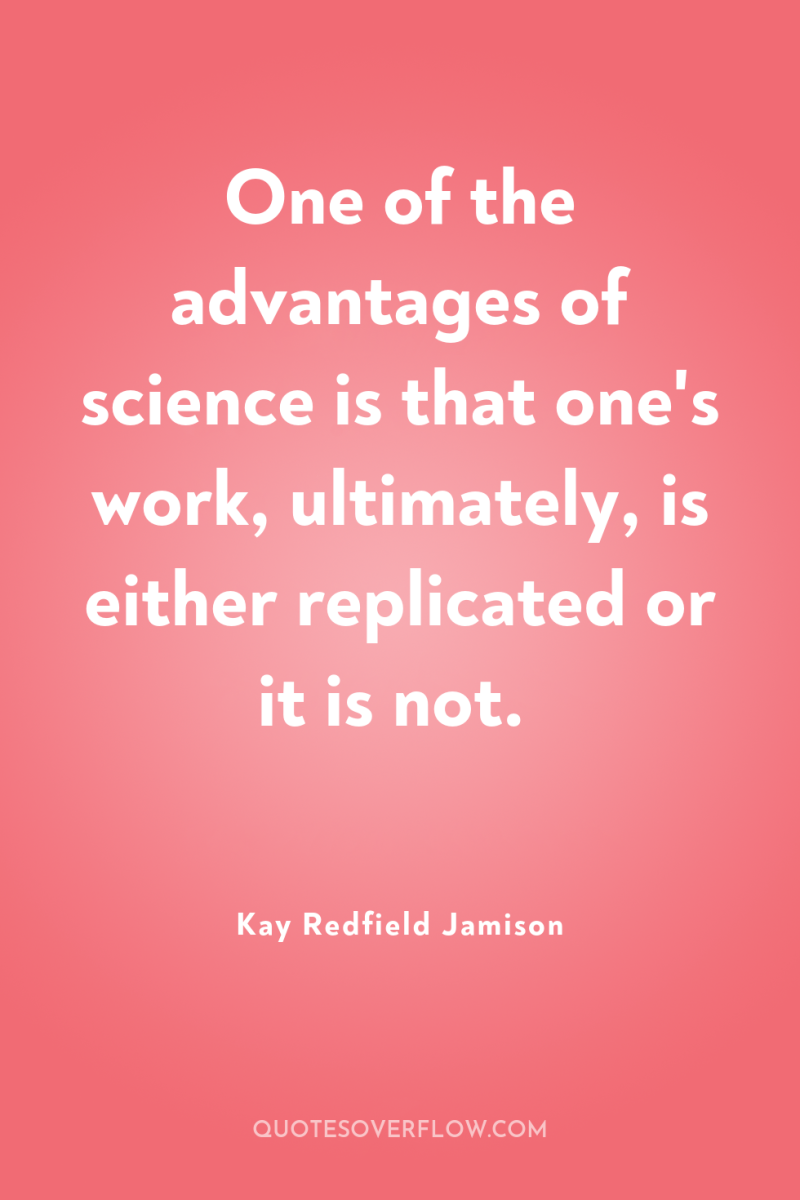
39
One of the advantages of science is that one's work, ultimately, is either replicated or it is not.Kay Redfield Jamison
40
Thought and science are therefore raising problems which their terms of study can never answer, many of which are doubtless problems only for thought. The trisection of an angle is similarly an insoluble problem only for compass and straight-edge construction, and Achilles cannot overtake the tortoise so long as their progress is considered piecemeal, endlessly having the distance between them. However, as it is not Achilles but the method of measurement which fails to catch up with the tortoise, so it is not man but his method of thought which fails to find fulfillment in experience.Alan W. Watts
41
Scientists study only those aspects of the universe that it is within their gift to study: what is observable; what is measurable and amenable to statistical analysis; and, indeed, what they can afford to study within the means and time available. Science thus emerges as a giant tautology, a "closed system". It can present us with robust answers only because its practitioners take very great care to tailor the questions.Colin Tudge
42
The objection that science is self-correcting and thus needs no outside interference overlooks, first, that every enterprise is self-correcting (look at what happened to the Catholic Church after Vatican II) and, secondly, that in a democracy the self-correction of the whole which tries to achieve more humane ways of living overrules the self-correction of the parts which has a more narrow aim -- unless the parts are given temporary independence. Hence in a democracy local populations not only will, but also should, use the sciences in ways most suitable to them. The objection that citizens do not have the expertise to judge scientific matters overlooks that important problems often lie across the boundaries of various sciences so that scientists within these sciences don't have the needed expertise either. Moreover, doubtful cases always produce experts for the one side, experts for the other side, and experts in between. But the competence of the general public could be vastly improved by an education that exposes expert fallibility instead of acting as if it did not exist. (Chapter 19) .Paul Karl Feyerabend
43
In the first case it emerges that the evidence that might refute a theory can often be unearthed only with the help of an incompatible alternative: the advice (which goes back to Newton and which is still popular today) to use alternatives only when refutations have already discredited the orthodox theory puts the cart before the horse. Also, some of the most important formal properties of a theory are found by contrast, and not by analysis. A scientist who wishes to maximize the empirical content of the views he holds and who wants to understand them as clearly as he possibly can must therefore introduce other views; that is, he must adopt a pluralistic methodology. He must compare ideas with other ideas rather than with 'experience' and he must try to improve rather than discard the views that have failed in the competition. Proceeding in this way he will retain the theories of man and cosmos that are found in Genesis, or in the Pimander, he will elaborate them and use them to measure the success of evolution and other 'modern' views. He may then discover that the theory of evolution is not as good as is generally assumed and that it must be supplemented, or entirely replaced, by an improved version of Genesis. Knowledge so conceived is not a series of self-consistent theories that converges towards an ideal view; it is not a gradual approach to truth. It is rather an ever increasing ocean of mutually incompatible alternatives, each single theory, each fairy-tale, each myth that is part of the collection forcing the others in greater articulation and all of them contributing, via this process of competition, to the development of our consciousness. Nothing is ever settled, no view can ever be omitted from a comprehensive account. Plutarch or Diogenes Laertius, and not Dirac or von Neumann, are the models for presenting a knowledge of this kind in which the history of a science becomes an inseparable part of the science itself - it is essential for its further development as well as for giving content to the theories it contains at any particular moment. Experts and laymen, professionals and dilettani, truth-freaks and liars - they all are invited to participate in the contest and to make their contribution to the enrichment of our culture. The task of the scientist, however, is no longer 'to search for the truth', or 'to praise god', or 'to synthesize observations', or 'to improve predictions'. These are but side effects of an activity to which his attention is now mainly directed and which is 'to make the weaker case the stronger' as the sophists said, and thereby to sustain the motion of the whole. .Paul Karl Feyerabend
44
The idea of a method that contains firm, unchanging, and absolutely binding principles for conducting the business of science meets considerable difficulty when confronted with the results of historical research. We find, then, that there is not a single rule, however plausible, and however firmly grounded in epistemology, that is not violated at some time or other. It becomes evident that such violations are not accidental events, they are not results of insufficient knowledge or of inattention which might have been avoided. On the contrary, we see that they are necessary for progress. Indeed, one of the most striking features of recent discussions in the history and philosophy of science is the realization that events and developments, such as the invention of atomism in antiquity, the Copernican Revolution, the rise of modern atomism (kinetic theory; dispersion theory; stereochemistry; quantum theory), the gradual emergence of the wave theory of light, occurred only because some thinkers either decided not to be bound be certain 'obvious' methodological rules, or because they unwittingly broke them.Paul Karl Feyerabend
45
Sadly, because of our tribal brains, science carries a hefty cost. Treasured ideas that are loved by the community may be left behind, unable to compete with conflicting observations. Admired heroes may be found to have been mistaken. Years of hard work can amount to nothing thanks to a single observation, making a lifetime of effort seem like a waste of time. For our tribal brain, the philosopher’s toolbox is full of double-edged knives, capable of cutting away our hopes with the myths.Mike McRae
46
How does it happen that a properly endowed natural scientist comes to concern himself with epistemology? Is there no more valuable work in his specialty? I hear many of my colleagues saying, and I sense it from many more, that they feel this way. I cannot share this sentiment. When I think about the ablest students whom I have encountered in my teaching, that is, those who distinguish themselves by their independence of judgment and not merely their quick-wittedness, I can affirm that they had a vigorous interest in epistemology. They happily began discussions about the goals and methods of science, and they showed unequivocally, through their tenacity in defending their views, that the subject seemed important to them. Indeed, one should not be surprised at this.Albert Einstein
47
He who has a true idea simultaneously knows that he has a true idea, and cannot doubt of the truth of the thing perceived.Baruch Spinoza
48
The order and connection of ideas in the same as the order and connection of thingsBaruch Spinoza
49
Explanation is where the mind rests.David Hume
50
People who have cut their teeth on philosophical problems of rationality, knowledge, perception, free will and other minds are well placed to think better about problems of evidence, decision making, responsibility and ethics that life throws up.Simon Blackburn
51
Ye cannot know eternal reality by a definition.C.s. Lewis
52
The desire to understand is almost synonymous with the desire to simplify, and it is closely bound up with the desire for certainty - for assurance. But, when we find we have over-simplified, this does not necessarily imply that our conclusions are wrong. It implies merely that they are less right than we thought, or that we have exaggerated their comprehensiveness.Rupert CrawshayWilliams
53
The most crucial problem with intellectual learning is that it receives the unknown on the grounds of the known.Raheel Farooq
54
Why should things be easy to understand?Thomas Pynchon
55
But, though all our knowledge begins with experience, it by no means follows that all arises out of experience.Immanuel Kant
56
It is within science itself, and not in some prior philosophy, that reality is to be identified and described.Unknown
57
The principle chore of brains is to get the body parts where they should be in order that the organism may survive. Improvements in sensorimotor control confer an evolutionary advantage: a fancier style of representing [the world] is advantageous so long as it... enhances an organism's chances for survival. Truth, whatever that is, takes the hindmost.Patricia Churchland
58
Truth is, something exists, and everything exists for a reason. Regardless if the reason is known or unknown, knowable or unknowable, reason exists and can be named.Unknown
59
…every feeling is the perception of a truth...Gottfried Wilhelm Leibniz
60
The mind leans on [innate] principles every moment, but it does not come so easily to distinguish them and to represent them distinctly and separately, because that demands great attention to its acts, and the majority of people, little accustomed to think, has little of it.Gottfried Wilhelm Leibniz
61
The mind is not only capable of knowing [innate ideas], but further of finding them in itself; and if it had only the simple capacity to receive knowledge…it would not be the source of necessary truths…Gottfried Wilhelm Leibniz
62
For the [innate] general principles enter into our thoughts, of which they form the soul and the connection. They are as necessary thereto as the muscles and sinews are for walking, although we do not at all think of them.Gottfried Wilhelm Leibniz
63
A prepared mind is always made up; it knows what it thinks and why it thinks that. When it's time to change, it just makes itself up a different way. A really made-up mind--made up properly, knowing what it knows and on what basis it knows it--is open. People close an undecided mind because they're trying to protect those sore uncertainties from getting bumped and scraped.John Barnese
64
Metagapism is the belief that love is the ultimate reality, literally god and the one shared soul, and the source, nature and destiny of all.Unknown
65
Logic is the science not of external forms of thought, but of the laws of development "of all material, natural and spiritual things", i.e., of the development of the entire concrete content of the world and of its cognition, i.e., the sum-total, the conclusion of the History of knowledge of the world.Vladimir Lenin
66
Irony is about contradictions that do not resolve into larger wholes, even dialectically, about the tension of holding incompatible things together because both or all are necessary and true. Irony is about humour and serious play. It is also a rhetorical strategy and a political method, one I would like to see more honoured within socialist-feminism.Donna J. Haraway
67
Is numerical equality (forced by the use of specific physical units) the same as conceptual equality? Of course NOT!Felix AlbaJuez
68
Although some of her passages seek to persuade the reader of the meaninglessness and marginalization of the mathematics, Hayles is content to use mathematics as a means for understanding Borges, perhaps in the same way a sponge riddled with holes is useful in sopping up fluid reality.Bloch William Goldbloom
69
He was pinched perspinngly in the epistemological dilemma of the skeptic, unable to accept solutions to problems he was unwilling to dismiss as unsolvable. He was never without misery, and never without hope.Joseph Heller
70
In consequence of the inevitably scattered and fragmentary nature of our thinking, which has been mentioned, and of the mixing together of the most heterogeneous representations thus brought about and inherent even in the noblest human mind, we really possess only *half a consciousness*. With this we grope about in the labyrinth of our life and in the obscurity of our investigations; bright moments illuminate our path like flashes of lighting. But what is to be expected generally from heads of which even the wisest is every night the playground of the strangest and most senseless dreams, and has to take up its meditations again on emerging from these dreams? Obviously a consciousness subject to such great limitations is little fitted to explore and fathom the riddle of the world; and to beings of a higher order, whose intellect did not have time as its form, and whose thinking therefore had true completeness and unity, such an endeavor would necessarily appear strange and pitiable. In fact, it is a wonder that we are not completely confused by the extremely heterogeneous mixture of fragments of representations and of ideas of every kind which are constantly crossing one another in our heads, but that we are always able to find our way again, and to adapt and adjust everything. Obviously there must exist a simple thread on which everything is arranged side by side: but what is this? Memory alone is not enough, since it has essential limitations of which I shall shortly speak; moreover, it is extremely imperfect and treacherous. The *logical ego*, or even the *transcendental synthetic unity of apperception*, are expressions and explanations that will not readily serve to make the matter comprehensible; on the contrary, it will occur to many that“ Your wards are deftly wrought, but drive no bolts asunder.” Kant’s proposition: “The *I think* must accompany all our representations , ” is insufficient; for the “I” is an unknown quantity, in other words, it is itself a mystery and a secret. What gives unity and sequence to consciousness, since by pervading all the representations of consciousness, it is its substratum, its permanent supporter, cannot itself be conditioned by consciousness, and therefore cannot be a representation. On the contrary, it must be the *prius* of consciousness, and the root of the tree of which consciousness is the fruit. This, I say, is the *will*; it alone is unalterable and absolutely identical, and has brought forth consciousness for its own ends. It is therefore the will that gives unity and holds all its representations and ideas together, accompanying them, as it were, like a continuous ground-bass. Without it the intellect would have no more unity of consciousness than has a mirror, in which now one thing now another presents itself in succession, or at most only as much as a convex mirror has, whose rays converge at an imaginary point behind its surface. But it is *the will* alone that is permanent and unchangeable in consciousness. It is the will that holds all ideas and representations together as means to its ends, tinges them with the colour of its character, its mood, and its interest, commands the attention, and holds the thread of motives in its hand. The influence of these motives ultimately puts into action memory and the association of ideas. Fundamentally it is the will that is spoken of whenever “I” occurs in a judgement. Therefore, the will is the true and ultimate point of unity of consciousness, and the bond of all its functions and acts. It does not, however, itself belong to the intellect, but is only its root, origin, and controller."–from_ The World as Will and Representation_. Translated from the German by E. F. J. Payne in two volumes: volume II, pp. 139-140.Arthur Schopenhauer
71
Philosophy is about everything when I say everything I mean both something and nothing. Something is what we can perceive and nothing is beyond our senses.Mark D. Ekperi